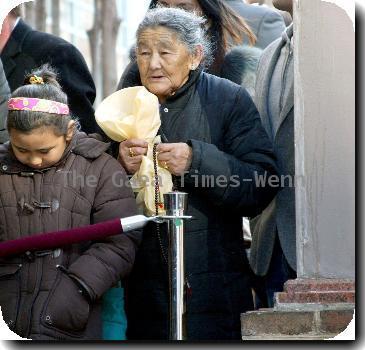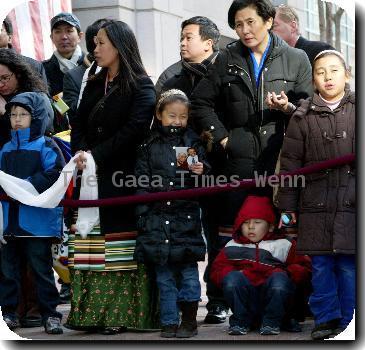Israelis urged to soften stand on West Bank settlement building to keep peace talks going
By Robert Burns, APThursday, September 16, 2010
Israel’s settlements key to peace talk progress
AMMAN, Jordan — Two days of Mideast peace talks appear to have brought Israel and the Palestinians closer to a deal that would allow those talks to continue, but even if the negotiations move forward far more difficult issues lay ahead.
Egyptian President Hosni Mubarak suggested a compromise over Israel’s plan to lift its partial ban on construction on the West Bank later this month, while Palestinian President Mahmoud Abbas said Thursday he sees no alternative to continuing negotiations in search of peace with Israel.
U.S. Secretary of State Hillary Clinton, speaking in Amman, said she is convinced that Netanyahu and Abbas are trying to seek common ground.
“They are committed and they have begun to grapple with the hard but necessary questions,” she said, shortly before leaving for the U.S. “I am convinced that this is the time and these are the leaders to achieve the result we all seek.”
Abbas’ comments came as Israel was coming under increasing pressure to extend its curb on Jewish settlement construction, and aides to the Palestinian leader suggested there might be movement toward a compromise on that issue.
Abbas had said previously that the talks could not survive if the Israeli building restrictions were lifted as planned.
“We all know there is no alternative to peace through negotiations, so we have no alternative other than to continue these efforts,” Abbas said Thursday, speaking through an interpreter in Ramallah, where the headquarters of the Palestinian National Authority is located.
It was unclear from Abbas’ remarks whether he was signaling that the Palestinians would remain committed to the talks even if Israel does not extend the limits on building.
Egypt’s leader said in a radio interview that he urged Israeli Prime Minister Benjamin Netanyahu to extend the restrictions for three more months to give peacemaking a chance.
Mubarak said he told Netanyahu the delay could give the two sides time to draft their future borders. After those lines are agreed, Mubarak reasoned, Israel can build within its future borders and the Palestinians within theirs.
In comments to Israel’s Channel 10 before she left the region, Clinton said for the first time that the U.S. would back a limited extension of the partial construction moratorium, calling the idea “extremely useful.”
“I don’t think a limited extension would undermine the process going forward if there were a decision agreed to by both parties,” she said.
Netanyahu’s office said Thursday that Israel doesn’t plan to extend the current limits, which are due to expire in late September.
But Israeli officials said they hoped to reach a compromise well before the current restrictions expire on Sept. 26 in hopes of avoiding a major crisis. The officials spoke on condition of anonymity because no formal decisions have been made.
Aides to Abbas said no deal had been reached on the settlement issue, but said they accept Mubarak’s proposal and expect that a compromise will be found. Previously, the Palestinians have said they would walk out on the talks if any construction resumes.
The aides spoke on condition of anonymity because they were discussing a sensitive diplomatic matter.
Michele Dunne, a Mideast expert at the Carnegie Endowment for International Peace, said Thursday the talks appear to have edged the process forward, although bigger challenges lay ahead.
The discussions in Egypt’s Sharm el-Sheikh and Jerusalem “got the talks rolling toward a possible compromise on the settlements moratorium issue, which probably will be reached over the next week or so,” she said. “But once again the parties are spending weeks dealing with a short-term issue to avert a crisis rather than getting down to the larger problems.”
On Thursday, Clinton and Abbas met at the Palestinian Authority’s West Bank headquarters.
Abbas thanked the Obama administration for its efforts to broker the current talks, the first in two years. “I know that this time is difficult and the circumstances are difficult, but the Americans are exerting active efforts to achieve this peace,” he said.
Later, Clinton traveled to Amman for lunch with Jordan’s King Abdullah, whose country already has a peace treaty with Israel and is a strong supporter of efforts to work out a deal between Israel and the Palestinians.
Dates for the next round of top-level negotiations are supposed to be determined during consultations next week.
Gaza militants opposed to the peace efforts have sent mortars and rockets crashing into southern Israeli communities in recent days, drawing retaliatory Israeli airstrikes.
Overnight, Israeli aircraft hit two Gaza targets that the military described as weapons storage facilities. No casualties were reported.
Palestinian official Raed Fattouh, who coordinates the flow of goods into Gaza with Israel, said the Israeli military also canceled plans to let new cars enter Gaza on Thursday for the first time in four years. The Israeli military had no immediate confirmation.
George Mitchell, the Obama administration’s envoy for Middle East peace, traveled to Syria on Thursday for talks with President Bashar Assad and the Syrian foreign minister about starting a separate Syria-Israel peace negotiation.
He told reporters the U.S. administration was determined to achieve comprehensive peace in the Middle East. “It is true that the parties still have profound differences … but we are determined to see it through,” he said.
____
Associated Press writers Mohammed Daraghmeh, Jamal Halaby and Dale Gavlak contributed to this report.
Tags: Africa, Amman, Egypt, Gaza Strip, Hillary Clinton, International Agreements, Israel, Jordan, Middle East, Mideast-talks, North Africa, North America, Palestinian Territories, Syria, Territorial Disputes, United States, West Bank




